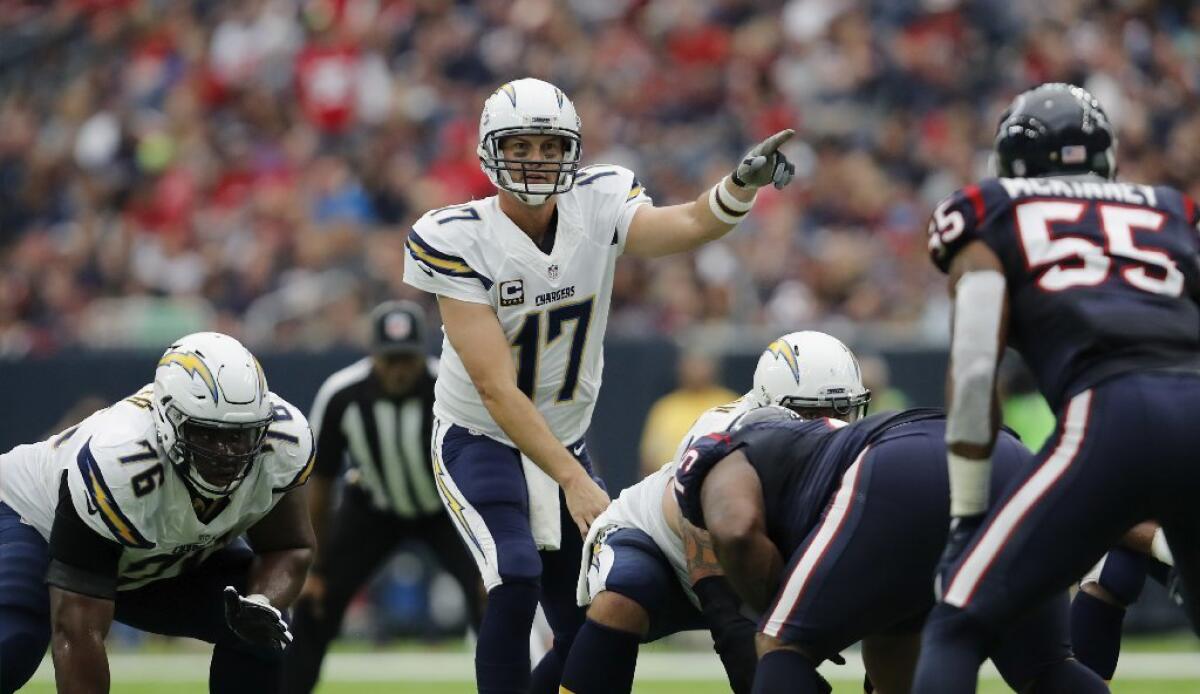Ask Farmer: What’s with quarterbacks yelling all the time? You’d thing they’d damage their vocal chords

Chargers quarterback Philip Rivers yells out signals from the line of scrimmage during a game against the Texans on Nov. 27.
- Share via
Have a question about the NFL? Ask Times NFL writer Sam Farmer, and he will answer as many as he can online and in the Sunday editions of the newspaper throughout the season. Email questions to: sam.farmer@latimes.com
What’s up with the voices of quarterbacks? With all that yelling at the line of scrimmage, you’d think they’d damage their vocal chords.
Tom Harris, La Crescenta
Farmer: Especially for visiting quarterbacks, it could get pretty old trying to bark out those snap counts and audibles for four quarters, and be loud enough for at least all the offensive linemen to hear. Remember, those signals tend to sound louder on TV because, as part of the collective bargaining agreement, either the center or the guard wears a microphone on his back. Makes for better TV sound. That’s why we could hear Peyton Manning yell “Omaha!” so clearly. But it wasn’t always that way.
“It’s changed so much now because of the silent count,” Hall of Fame quarterback John Elway said. “You used to have to scream so loud… When it’s loud in a visiting stadium, it doesn’t matter how loud your voice is, those tackles aren’t going to hear you.”
Philip Rivers said that during his rookie year in San Diego he learned a good voice habit from Cam Cameron, then offensive coordinator of the Chargers: “I remember the first day out there, just as I was talking to you, I was out there saying, ‘Set. Green 80. Green 80.’ And Cam said, ‘Whoa! You’ve got to train your voice and scream that. There are going to be 80,000 people going nuts. They can’t hear you.
“So we would be out there in pre-practice as loud as we could say the cadence. Guys are looking over there like, ‘What in the world are they doing?’ We have crowd noise in practice during the week when we’re on the road. So you have to be loud. You can’t afford to lose your voice, but there’s no question you feel it.”
::
When a ballcarrier is hit going out of bounds it’s a 15-yard penalty. But when a ballcarrier is hit after scoring and is well into the end zone, no penalty. Many of these hits are a result of frustration and certainly would seem to qualify as unsportsmanlike conduct?
Jim Davis, Hawthorne
Farmer: The standards for unnecessary roughness should apply in both cases. Two weeks ago, for instance, Green Bay quarterback Aaron Rodgers scored on a 20-yard run and was hit hard after he crossed the goal line by Tennessee corner Perrish Cox, who was flagged. However, Fox rules analyst Mike Pereira notes officials do view the sideline and goal line differently.
“The notion of going out of bounds versus going in to score is a little bit different,” he said. “Trying to keep a guy from scoring versus punishing a guy when he’s going out of bounds and giving himself up is different. As long as it’s right near the goal line, one foot might be in, but I think you’re a little bit more lenient at the goal line. But there are going to be calls.”
Follow Sam Farmer on Twitter @LATimesfarmer
More to Read
Go beyond the scoreboard
Get the latest on L.A.'s teams in the daily Sports Report newsletter.
You may occasionally receive promotional content from the Los Angeles Times.











